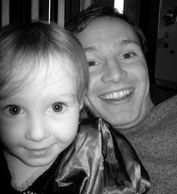Students and alumni of Gordon’s Jerusalem and Athens Forum (JAF) honors program were invited to submit essays considering how a Christian understanding of the Imago Dei can help us think well and wisely about the biotechnological age upon which we are now entering. Josh Hasler ’09 (pictured, right) was this year’s winning essayist; honorable mentions went to Jenna Breitbarth ’10 and Suzanne Loughry ’09. Excerpts below; read the full essays online at www.gordon.edu/jafessay.
Reflections of an Older BrotherJosh Hasler ’09
I’ll venture to say it’s rare for college students to find infants when they return from their first year away from home. (Sorry to get anecdotal at the outset—but be comforted that my personal narrative will influence my sweeping claims about the nature of the image of God.) With a very young sister around, reading children’s stories has been a rewarding part of my visits home, and it probably comes as no surprise that reading about children tends to be more affecting for me since my sister was born.
It occurs to me that I write for many parents, grandparents, most of whom probably have had children for some time. But as a young and as-yet childless buck from undergrad, the experience of watching a young child grow and develop language from visit to visit is a strange and bizarre experience.
I begin this way for two reasons. First, people like kids and my argument will only need those sympathies from here on out. And second, the relation between the image of a child and the image of God is, I think, inextricable.
It’s probably true that, as another sister pointed out since my leaving for school, I’ve also become boring. Fair enough. But her observation illustrates the oft-bemoaned corollary of becoming: to be anything is also to not be something else—to remove one infinity of possibility while adding another (although maybe less exciting). The point is an ancient one so I won’t dwell on it. Hopefully a tenuous thesis emerges: Kids are interesting because they’re not yet much of anything.
The other half of my thesis is that children, by reason of their becoming, represent the substance of hope and good imagination in the human world. The clay, just animated by the breath of God, immediately begins growing, developing, making possibility. They begin to imagine, create and innovate. That imagination, the very substance of possibility, also contains the much-needed prophetic voice in the disciplines of bioethics and ethics as a whole.
I use the term prophetic voice (now probably quite overused) metaphorically. That is, the use of certain abilities with which humanity is gifted for the outpouring of what we believe to be God’s voice in absentia. That is, we do our best when God is not revealing. We also join a long tradition of imaginative exploration through stories and myths of warnings, exhortations and possibilities. It is this latter concept I think we are most apt to explore in the search for Imago Dei because it begins with something like birth and circles to something resembling a child.
Broadening “Bioethics:” From Defense to AdvocacyJenna Breitbarth ’10
In the heated discussion between the pews and the lab, Christians often get lost in the narrow concerns of developed-world ethics. We become victims of the 90/10 gap: In discussing the issues of bioethics today, 90 percent of discussion centers on issues that affect only 10 percent of the world’s population. As we in the developed world discuss the morality of prenatal gender selection, the other 90 percent are discussing infant mortality and malnutrition in children.
Why I’m Not as Worried as I “Should” Be by the Biotechnological Revolution Suzanne Loughry ’10
Once upon a time at a college not too far away, a girl signed up for a class called Topics in Bioengineering. She found herself immersed in scientific papers full of BioE lingo and funky graphs discussing everything from endothelial cells to neuroprosthesis to microspheres to dirt. At first even the abstracts sounded like gibberish, but by the end of the semester she was reading those journal articles with ease.
Those papers are still on my computer. I’m no longer studying engineering, but I didn’t leave because of the biotechnology. I wasn’t scared away by the incredible results in bioengineering. In fact, the papers fascinated me.
<< BACK
